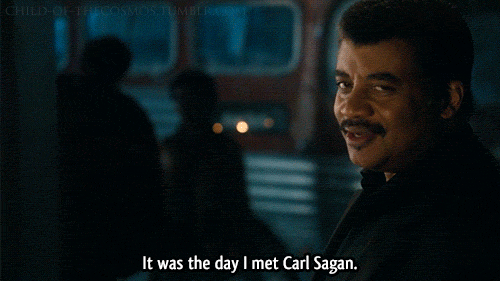
I’ll admit it – I’m addicted to Netflix. I binge-watch seasons, even entire series, in days. After finishing Parks and Rec for the second time, I decided to give something new a try. “Cosmos” immediately interested me. As someone who loves science and astrophysics (yet miserably fails at doing math), I wanted to see what the hype was about.
“Cosmos: A Spacetime Odyssey” aired recently this year and succeeded in bringing hard science to the general public. Based off the original “Cosmos: A Personal Voyage”, hosted by late astrophysicist Carl Sagan, host Neil deGrasse Tyson took viewers on a journey through space and time. He showed us the formation of the solar system, the distant worlds of our neighboring galaxies and gave us insights on what may happen to Earth millions of years from now.
As a self-proclaimed science nerd, this series filled me with joy. But some claims Tyson made were downright terrifying. I’m not claiming to know everything about science and physics: I’m merely a girl who has an interest in the stars, who took an astrophysics course (and got an A, duh) and who enjoys being challenged. I’m sure I’m not the only person who freaked out over points made on Cosmos, so I summarized the big things that made me tick and I’ve decided to explain them (in the most non-science-y way, sorry Sagan/Tyson/Einstein/Nye/Every other great scientist.)
1. The constant usage of the term “known/observable universe”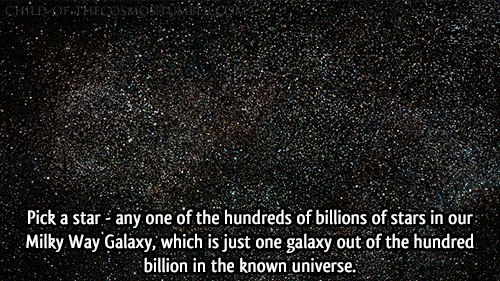
Hearing this instantly gives me a panic attack. What do you mean “observable” universe?! There’s MORE?! But there’re already like…billions upon billions of stars and galaxies that we can see! That’s not ALL of them?! Then, of course, this gets me thinking about aliens. Aliens must exist…right? In the unknown/unobserved universe? They have to be real. Tyson, c’mon, stop scaring me.
2. The use of time travel (in regards to seeing stars)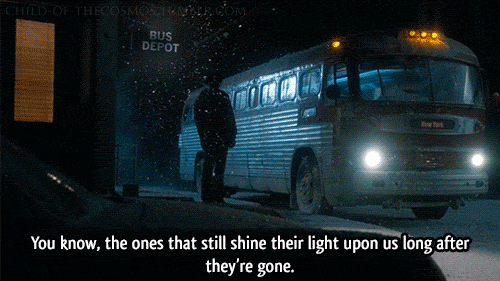
It’s basically common knowledge–at least, it should be–that the light we see from stars is from long ago. Light can only travel at the speed of light, and the speed of light is only so fast. Ergo, we’re seeing light that left a star thousands, even millions, of years ago. That star must be dead, right? What if every star is dead because the universe is gone and because it takes so long to reach us we don’t know that we’re alone in the universe? These questions haunt my nightmares. Literally. Watching “Cosmos” gave me nightmares about getting sucked into black holes that played “Wish You Were Here” by Fleetwood Mac on repeat.
3. We never really touch anything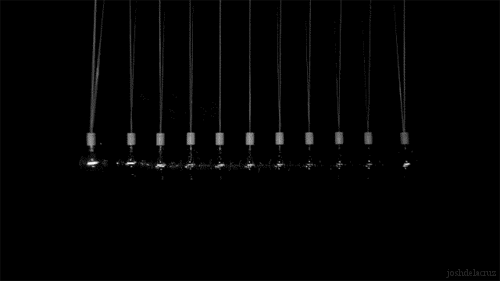
This is another thing that ruined me. How can we possibly not touch things?! My cat is soft. My computer is cold. My skin is dry. I can literally feel it! How are these sensations merely electrons/atoms/protons (I forgot which one it is) repelling each other? I do not understand. This scares me so much. We’re essentially always floating when we’re sitting or laying down. I really don’t like this.
4. Tardigrades, tardigrades, TARDIGRADES
These little water creatures (that have kind of cute mouths) can survive anything. Tyson stated that they can survive in boiling heat, freezing temperatures, even the vacuum of deep space. And these tough animals are around the size of a grain of salt. These minuscule creatures are BEASTS. They can survive practically anything in any climate. Humans are not that durable. We panic if its too hot or too cold. We will never be tardigrades. This sucks.
5.Neutrinos
Now, I have a special connection to neutrinos because I think they’re awesome and one of my favorite professors, Professor Jessica Uscinski at American University, does a lot of work with them. (Side note: Prof. U is amazing.) Neutrinos are the byproducts of nuclear fusion (hydrogen→helium in stars) that are almost as fast as the speed of light. They’re also pretty much undetectable, as they pass through all matter without making a fuss. Basically, neutrinos are intense and seem crazy hard to study. Tyson noted that there are neutrinos left over from the Big Bang (14 billion years ago when the universe was created.) NEUTRINOS. FROM. THE. BIG. BANG. Still floating about in space, passing through all matter. I worry about neutrinos…they’re homeless. Will they ever find a home?! I wish I could keep them at my house and bake them cookies and tell them they’re badasses (okay – I’ll stop fantasizing about neutrinos now.)
6. Harmful chemicals in the environment
Showcased through Clair Patterson’s work with lead and his eventual defamation of leaded gasoline, Tyson tells us the ways we’re currently harming the Earth. We use so many chemicals, we burn so much gasoline and coal and oil that the amount of carbon dioxide in our air hasn’t been recorded on Earth since the time of the dinosaurs. Whoa. Food for thought: why don’t we just stop using up these resources that are clearly fucking our planet up? Oh no, the gas companies make too much money to ever consider stopping. The power plants make way too much money to ever consider stopping. We all know we have a problem, what with the polar vortex in the Northeast and debilitating droughts in the Southwest – let’s fix it.
7. Pangea
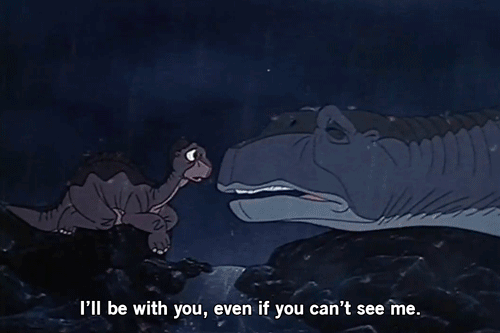
Okay, so we’ve known for a while that at one point in the Earth’s history, all of the continents were once conjoined to form Pangea, the super-continent. Due to earthquakes (shifting of plate tectonics beneath the ocean’s surface) these continents separated into the seven we know today. Isn’t that just a little crazy? The Earth was moving and shaking and ripping things apart while thousands of life forms existed. Do you think dinosaur families were separated? Could some of our early ancestors have fallen into the ocean during these shifts? Did the animals in warmer climates adapt if their tectonic plate moved them up north? So many questions. So few answers. RIP in peace little ancestors that didn’t make it.
8. Life on Mars

We’ve known about this for a while, too. Recent Mars expeditions have shown us that there was once water on the barren, rocky planet. Water = one of the elements to sustain life. Tyson tells the story of the Nakhla meteorite hitting Earth in 1911, explaining how life on Earth could’ve potentially come from other planets. When planets are hit by asteroids, they fling rocks into the air. These rocks stay in a dormat orbit until another planet’s gravitational pull brings them crash-landing onto their world. Tyson says that some life forms that burrowed themselves into these rocks could somehow stay alive in space, and when they come crash-landing onto a new planet, they start over again. Do you understand how scary that is?! We potentially could’ve crash-landed from Mars, or Jupiter, or some other planet. Our rocks that had life could’ve potentially crash-landed on other planets! I could have a cousin somewhere out in the Milky Way. Hi, cuz.
9. Project Diana (sending radio signals into space)
In the 40s, Project Diana showed us that radio signals can be sent into space. Since then, Tyson told us that we’ve been listening to space, seeing if anyone else has been sending radio waves out as well. So far, we’ve heard nothing. But this all depends on the time the other civilizations may have sent radio waves out–time travel and all that jazz. So we could’ve just missed a transmission. Or we might not have the technology needed to hear them. Tyson also noted that the radio waves we transmit continue to travel throughout space–so that shout out you gave to your 6th grade crush on the radio? Yep. Aliens have probably heard it. Your excited screams when you won front row tickets to the Backstreet Boys? Yep. Aliens probably heard that too.
10. The vast expanse of the universe 
I know I touched upon this earlier with the known/observable universe, but this show makes you question your own existence. We’re a tiny planet, in a tiny solar system, in a tiny part of a huge galaxy that’s a part of a gigantic universe. You’re just one life on that tiny planet, surrounded by billions of other lives. We all know that in five billion years or so, the sun is going to expand into a red giant and possibly consume the Earth. All our accomplishments, our marks made will vanish. Just like that. It’s scary to think about. Not to worry, though, Tyson comforts us by saying that we’ll hopefully be smart enough to have moved onto a new planet by then. Hopefully.
Good luck trying to sleep tonight.